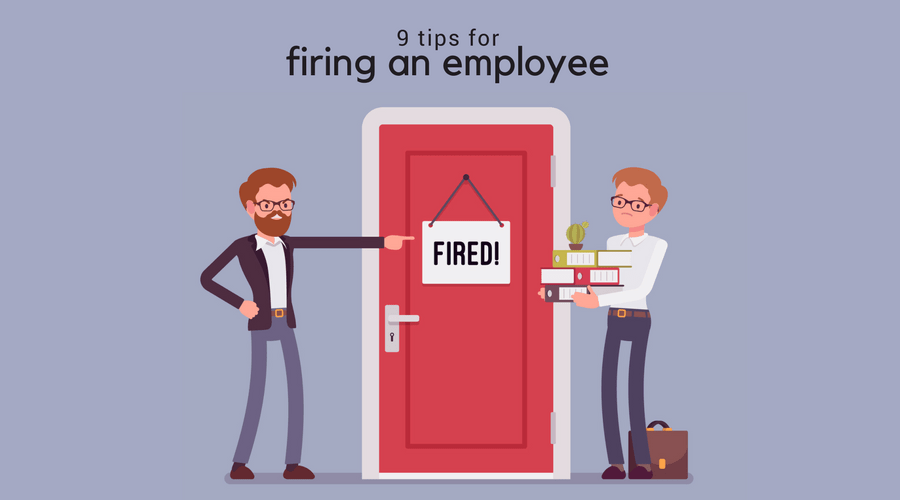9 Tips for Firing an Employee

We’ve said it before (and we’ll probably say it again) – “Hire Slow, Fire Fast”. Firing an employee is never fun, and when you had a hard time finding someone to fill the position in the first place, it’s tough to know when it’s time to let someone go.
Before you fire someone, make sure you know why you’re firing them:
- Illegal activities (make sure you have evidence to back it up) – theft, lying, fraud, assault, etc.
- Performance-related (make sure to discuss improvement plans first) – consistently missing deadlines, not meeting expectations, not following through with a project, etc.
- Interpersonal (make sure to discuss the problems first) – failing to communicate effectively, inability to get along with coworkers, or not following established company policies (like an attendance policy), etc.
If the reason you’re considering firing an employee is performance-related or interpersonal, figure out what’s causing the problem. Maybe they don’t really understand what their job entails, and you just need to review expectations with them. Or, maybe they have to get their kids to school in the mornings, and you can consider giving them a more flexible schedule to help out.
If they’ve had multiple chances and still aren’t fixing their behavior, though, then it might be time to cut them loose.
Tips to Make Firing an Employee Easier (for Everyone)
If you’ve decided to fire someone, try to make it as easy as possible to help prepare the employee for their job hunt.
Make Sure There are No Legal Ramifications
Check with your legal counsel to make sure the employee won’t be able to sue you for wrongful termination or discrimination.
Make sure the person was employed at-will, so they can’t try to sue you for breaking their contract.
You can also protect yourself by documenting every conversation you have with the employee concerning their behavior and performance. After every conversation, have the employee sign a document stating what the conversation was about.
Make Sure It’s Not a Surprise
If you’re firing someone for performance issues or their behavior, then you should have discussed it with them first and given them time to fix the problem. You may have even put them on a performance improvement plan.
Keep It Professional & Fire the Employee Privately
When you fire the employee, make sure you’re compassionate, but not overly so. Remember, it’s a business decision, not a personal decision, so don’t get emotional.
You should also make sure it’s in private, away from prying eyes (and ears).
But, Have a Witness Present
You never know how the person is going to react. Having a witness present can help you if the person threatens retaliation, gets violent, or tries to claim you said something you didn’t.
Provide Reasons for Firing Them
Don’t just tell the employee that their fired and leave it at that. They should already know why it’s happening. But, telling them why you made the decision will give them some closure and help them improve for their next job.
Go Over the Final Details
The employee will probably have a lot of questions about their final paycheck, when their benefits end, whether they’ll get a severance package, how to file for unemployment benefits, and more.
Don’t make them ask those questions (they might be too stunned to know what to ask) – have the answers ready and tell them what to expect. You should also have all the information written up in a packet for them to take with them (they’re probably only half listening and definitely won’t remember everything).
Keep It Short and to the Point
Don’t make the person sit there and listen to their faults for a long time. They probably want to get out of that room as quickly as possible. Just tell them the facts, go over the final details, listen to what they have to say, then end the meeting.
Don’t leave any room for ambiguity. They’re fired, and it’s not up for discussion.
Let the Employee Leave Immediately
The last thing the person wants to do is stick around after they’ve been fired. Ask them if they’d like to take their personal belongings now, or if they’d prefer to pick them up later. They might not want to be further embarrassed by cleaning out their desk in front of all their former coworkers.
If they choose to come back later, schedule a time before the office opens or after it closes to save them from even more embarrassment.
Don’t Ruin Their Weekend
If you fire someone on a Friday, they’ll probably sit at home all weekend dwelling on it. Nobody wants to spend their weekend thinking about the fact that they were just fired.
If you fire them earlier in the week (like on a Monday), they’ll be able to jump into the job search more quickly.


